Design decisions for buildings and communities are critical to efforts to increase local and regional resiliency. Building designers — of residential, institutional, and commercial structures — should strive to incorporate passive and active survivability concepts into new and renovated structures.
Community planners and developers need to incorporate concepts that increase the capacity to maintain transportation flow, strategies to handle water management, and infrastructure approaches that will withstand a variety of risks.
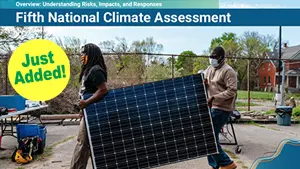
5th National Climate Assessment
The Fifth National Climate Assessment is the US Government’s preeminent report on climate change impacts, risks, and responses. It is a congressionally mandated interagency effort that provides the scientific foundation to support informed decision-making across the United States.
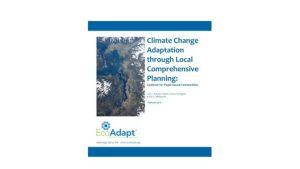
Adaptation Through Local Comprehensive Planning: Guidance for Puget Sound Communities
This extensive guidance document was developed as a result of a vulnerability assessment and local comprehensive plan update process undertaken by the City of Bainbridge Island, which worked with the climate consulting firm EcoAdapt.
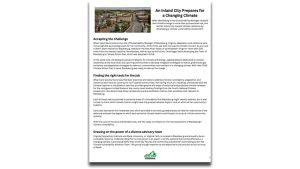
An Inland City Prepares for a Changing Climate
When Blacksburg’s new Sustainability Manager realized that climate change is more than just sea level rise, she led her inland city toward climate resilience by developing a climate vulnerability assessment.
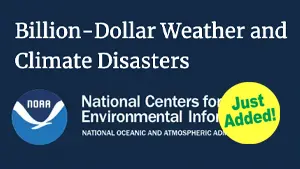
Billion-Dollar Weather and Climate Disasters
The National Centers for Environmental Information’s (NCEI) Billion-Dollar Disasters product is intended to show the impact of extreme weather and climate events on the economy in inflation-adjusted dollars.
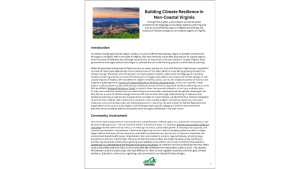
Building Climate Resilience in Non-Coastal Virginia
This report identifies four relevant categories of actions that could be taken to promote resilience in non-coastal Virginia: community organizing, education initiatives, economic productivity, and improving access to resources.
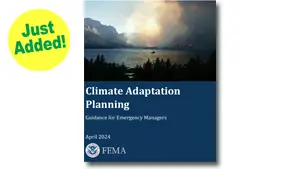
Climate Adaptation Planning: Guidance for Emergency Managers
FEMA’s Climate Adaption Planning: Guidance for Emergency Managers is intended to help state, local, tribal, and territorial (SLTT) emergency managers incorporate climate adaptation into emergency management planning efforts.
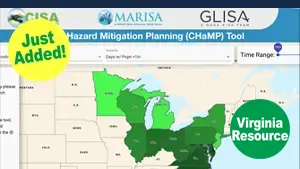
Climate and Hazard Mitigation Planning (CHaMP) Tool
CHaMP provides users with a single point of access to county-, state- and region-specific historical climate and hazard data and projected climate information.
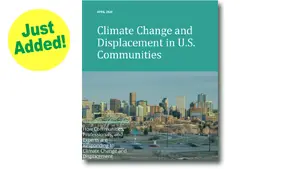
Climate Change and Displacement in U.S. Communities
EcoAdapt conducted a survey with the Strong, Prosperous, and Resilient Communities Challenge to determine if and how people working to address displacement pressures are considering the effects of climate change. This survey is part of a broader project in collaboration with the Urban Displacement Project to better understand the intersections between climate change and displacement pressures.
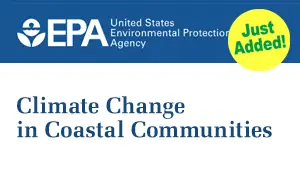
Climate Change in Coastal Communities
US EPA maintains a website that focuses on essential information for coastal communities planning for the effects of climate change.
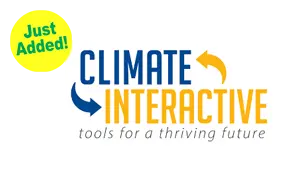
Climate Interactive
Climate Interactive hosts a team of system dynamics modelers who create user-friendly climate simulators—spanning topics of international policy, cutting-edge climate solutions, energy dynamics, climate justice, and more.

5th National Climate Assessment
The Fifth National Climate Assessment is the US Government’s preeminent report on climate change impacts, risks, and responses. It is a congressionally mandated interagency effort that provides the scientific foundation to support informed decision-making across the United States.

Adaptation Through Local Comprehensive Planning: Guidance for Puget Sound Communities
This extensive guidance document was developed as a result of a vulnerability assessment and local comprehensive plan update process undertaken by the City of Bainbridge Island, which worked with the climate consulting firm EcoAdapt.

An Inland City Prepares for a Changing Climate
When Blacksburg’s new Sustainability Manager realized that climate change is more than just sea level rise, she led her inland city toward climate resilience by developing a climate vulnerability assessment.

Billion-Dollar Weather and Climate Disasters
The National Centers for Environmental Information’s (NCEI) Billion-Dollar Disasters product is intended to show the impact of extreme weather and climate events on the economy in inflation-adjusted dollars.

Building Climate Resilience in Non-Coastal Virginia
This report identifies four relevant categories of actions that could be taken to promote resilience in non-coastal Virginia: community organizing, education initiatives, economic productivity, and improving access to resources.

Climate Adaptation Planning: Guidance for Emergency Managers
FEMA’s Climate Adaption Planning: Guidance for Emergency Managers is intended to help state, local, tribal, and territorial (SLTT) emergency managers incorporate climate adaptation into emergency management planning efforts.

Climate and Hazard Mitigation Planning (CHaMP) Tool
CHaMP provides users with a single point of access to county-, state- and region-specific historical climate and hazard data and projected climate information.

Climate Change and Displacement in U.S. Communities
EcoAdapt conducted a survey with the Strong, Prosperous, and Resilient Communities Challenge to determine if and how people working to address displacement pressures are considering the effects of climate change. This survey is part of a broader project in collaboration with the Urban Displacement Project to better understand the intersections between climate change and displacement pressures.

Climate Change in Coastal Communities
US EPA maintains a website that focuses on essential information for coastal communities planning for the effects of climate change.

Climate Interactive
Climate Interactive hosts a team of system dynamics modelers who create user-friendly climate simulators—spanning topics of international policy, cutting-edge climate solutions, energy dynamics, climate justice, and more.
